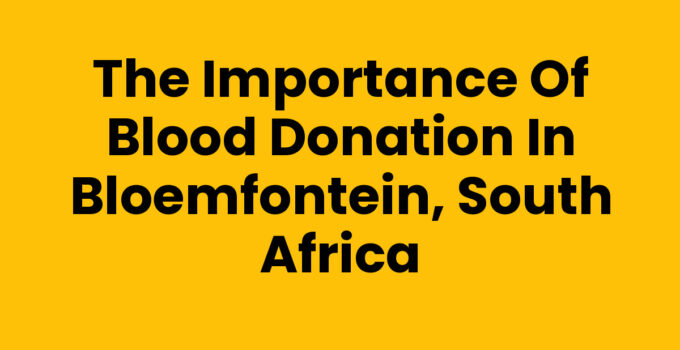Blood donation is a vital aspect of healthcare that can save lives and improve the well-being of individuals in need. In Bloemfontein, South Africa, consistent blood donations are crucial, especially in areas with high demand for blood products. This post explores the significance of blood donation, the process involved, and highlights ways you can contribute to this life-saving initiative.
Blood Donation Bloemfontein: What You Need to Know
Blood donation is the act of voluntarily providing blood for transfusion. In Bloemfontein, local blood banks rely on the generosity of donors to maintain adequate blood supplies. The process is simple but profoundly impactful.
Step-by-Step Guide to Donating Blood
- Eligibility Criteria: Before donating blood in Bloemfontein, ensure you meet the eligibility criteria set by the South African National Blood Service (SANBS). Generally, you must be between the ages of 16 and 65, weigh at least 50 kg, and be in good health.
- Find a Donation Site: Locate a nearby blood donation center or mobile blood collection unit in Bloemfontein. You can use the SANBS website to find your nearest location.
- Book an Appointment: While walk-ins are often welcome, it’s advisable to book an appointment to ensure you don’t have to wait too long.
- Preparation: On the day of your donation, eat a healthy meal and stay hydrated. Avoid fatty foods and alcohol.
- The Donation Process: Upon arrival, you will be registered, and a staff member will assess your eligibility through a brief health questionnaire and a mini-physical exam (checking blood pressure, pulse, and hemoglobin levels).
- Donation: The actual blood donation takes about 10 to 15 minutes. You will either sit or lie down, and a sterile needle will be inserted into your arm. Approximately 450 ml of blood will be collected.
- Post-Donation Care: After donating, you’ll be advised to rest for a few minutes. You’ll also be provided with refreshments to help replenish your energy.
- Frequency: Donors can give blood every 56 days (two months) for whole blood and more frequently for specific donations, like platelets.
The need for blood is constant. By donating, you’re not only helping those in emergencies but also aiding in routine medical procedures such as surgeries and cancer treatments.
Recommended Reading: Explore the Charm of Willows Road, Bloemfontein Today!
Benefits of Blood Donation
Donating blood comes with numerous benefits, not only for the recipients but also for the donors themselves.
- Saves Lives: Each donation can save up to three lives. As Blood donation in Bloemfontein increases, the community’s health improves.
- Health Benefits for Donors: Regular blood donation can improve cardiovascular health and decrease iron overload, reducing risks associated with heart disease.
- Community Connection: Participating in blood drives fosters a sense of community as people come together for a common cause.
- Free Health Screening: Donors receive free health checks before donating, which can help identify potential unknown health issues.
With various health benefits and the opportunity to make a significant impact on the lives of others, blood donation is an easy yet effective way to contribute to society.
Further Reading: Exploring Estoire, Bloemfontein: A Hidden Gem in South Africa
Common Misconceptions About Blood Donation
Despite the clear benefits, several misconceptions about blood donation can deter people from participating. Addressing these can encourage more donations.
- Pain: Many fear that donating blood will be painful. However, most donors report only feeling a quick pinch from the needle.
- Fear of Needles: While this is common, knowing that the procedure is quick can help ease anxiety.
- Impact on Health: Some believe that donating blood weakens their immune system. In reality, healthy individuals who donate regularly can maintain their health and energy levels.
- Eligibility: Potential donors often think they aren’t eligible. In most cases, many individuals may qualify, and the eligibility criteria are set to protect donor health.
Dispelling these myths encourages more people to consider becoming donors, thus contributing to a robust blood donation program in Bloemfontein.
Conclusion: Blood donation is a pressing need in Bloemfontein, playing a pivotal role in saving lives. It’s a straightforward process that benefits both the donor and the recipient alike. By spreading awareness and encouraging others to donate, we can help sustain healthy blood supply levels within our community.
Related Guide: Understanding Bloemfontein Crime Stats: Insights and Analysis
Frequently Asked Questions
How often can I donate blood in Bloemfontein?
You can donate blood every 56 days, which is approximately two months.
What are the eligibility requirements for donating blood?
You must be between 16 and 65 years old, weigh at least 50 kg, and be in good health.
Is donating blood safe?
Yes, donating blood is very safe. Blood collection is done by trained professionals using sterile equipment.



